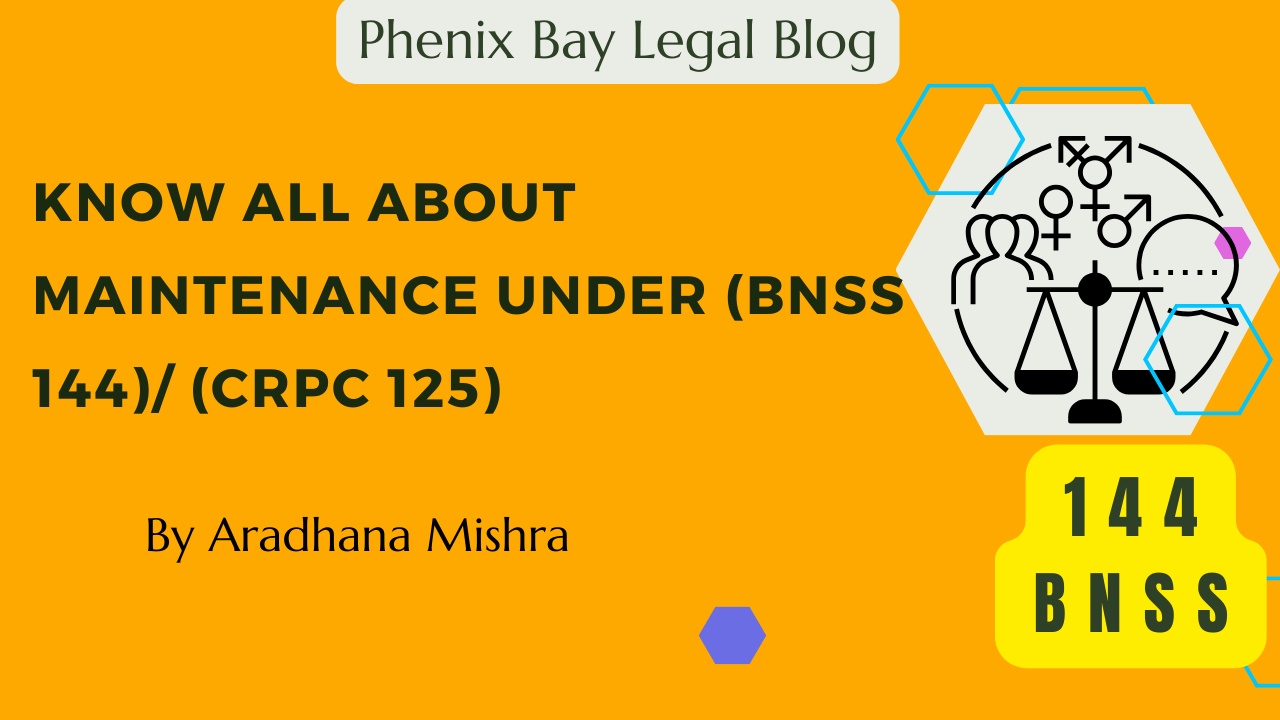
KNOW ALL ABOUT MAINTENANCE UNDER (BNSS 144)/ (CrPC 125)
This section of the Bharatiya Nagarik Suraksha Sanhita, 2023, outlines the obligations of individuals with sufficient means to provide maintenance for their spouses, children, and parents who cannot maintain themselves.
KNOW ALL ABOUT MAINTENANCE UNDER (BNSS 144)/ (CrPC 125)
Introduction
Section 144 of BNSS establishes the duty of individual person with sufficient financial resources to maintain and support those family members who cannot maintain themselves. This includes spouse, children and elderly parents, but not siblings.
This section of the Bharatiya Nagarik Suraksha Sanhita, 2023, outlines the obligations of individuals with sufficient means to provide maintenance for their spouses, children, and parents who cannot maintain themselves. It allows a Judicial Magistrate to order monthly allowances and interim maintenance, while also setting conditions under which these allowances can be denied or cancelled.
WHO CAN GET A MAINTENANCE?
- Wife: This includes a wife who is unable to support herself. Notably, it also includes a divorced woman who has not remarried. The legally wedded wife and separated wife can also get maintenance. The provision applies irrespective of the religion or personal law under which the marriage was solemnized.
- Children: This includes both legitimate and illegitimate children, regardless of whether they are married. Adult children having mental or physical abnormality or injury can also claim maintenance. Unmarried daughters can claim maintenance until their marriage or until they became financially independent.
- Parents: If parents (biological or adoptive) are unable to support themselves or are dependent on their son/daughter, they may also be eligible for maintenance.
CONDITIONS OF MAINTENANCE -
- Inability to Maintain: The persons claiming maintenance must prove that they are unable to maintain themselves due to lack of income or resources.
- Female child(whether unmarried or married ): The unmarried female child can grant maintenance until she attains her majority.In case of married daughter,if her husband is unable to take care of the sufficient means.
- Divorced wife: A divorced wife can claim maintenance only if she doesn't marry again.
- Proof of neglect or Refusal: The court must be satisfied that the person responsible for monthly allowance for maintenance has willfully neglected or refused to provide financial support despite being fit to do so.
- Sufficient Means: The court will assess whether the person from whom maintenance is claimed has sufficient means to provide financial support. The term “sufficient means” includes income from employment, business, property, or any other financial assets.
AMOUNT OF MAINTENANCE:-
- Financial Capacity: The earning income,assets and overall financial resources of person who will pay maintenance are taken into consideration. If the person has multiple dependents, the court may adjust the maintenance amount accordingly.
- Needs of the Claimant: The reasonable needs of the person claiming maintenance are considered, which include basic necessities such as food, clothing, housing, education, and medical expenses,which will allow them to live with dignity.
- Standard of Living: The court consider the social and economic status of both claimant and respondent.
- Earning capacity of the wife:The court will consider the wife's earning capacity and needs to ensureing that if she is not burdened unnecessarily.
- The court may also consider the age and employment of the parties, the duration of the marriage, and any serious disability or ill health of a spouse or child
- Obligations of the Respondent: The court also considers the financial obligations of the respondent, including other dependents who may rely on them for support.
The court ensures that the amount awarded is sufficient for the basic needs of the claimants, but it also takes care not to impose an unreasonable financial burden on the person responsible for paying maintenance.
INTERIM MAINTENANCE -
During the ongoing process of proceeding ,a monthly allowance is granted as maintenance which is called interim maintenance.
- This includes wife or child or parents.
- It includes the expenses of proceedings .
- Monthly maintenance and interim maintenance shall be disposed within 60 days of the date of service of notice of the application.
PROCEDURE OF CLAIMING MAINTENANCE:-
- Filing the Application: The claimant (whether the wife, children, or parents) must file an application before the Judicial Magistrate of First Class or the Metropolitan Magistrate. The application should state the reasons for seeking maintenance, the relationship with the person from whom maintenance is sought, and proof of neglect or refusal to provide financial support.
- Notice to the Respondent: Once the application is filed, the court will issue a notice to the respondent (the person liable to pay maintenance), requiring them to appear in court and respond to the claim.
- Submission of Evidence: Both the claimant and the respondent will have the opportunity to present evidence. The claimant will need to show their financial dependence and the neglect or refusal of the respondent to provide support. The respondent can submit evidence of their financial capacity or any existing obligations that may affect the amount of maintenance.
- Court Hearing: After considering the evidence and arguments from both parties, the court will pass an order regarding the maintenance amount and other conditions.
- Maintenance Order: The court will issue an order specifying the amount of maintenance to be paid and the frequency of the payment (monthly or otherwise). The court may also specify the method of payment (bank transfer, direct deposit, etc.).
WHAT IF THE PERSON FAILS TO PROVIDE MAINTENANCE (without sufficient cause)/ENFORCEMENT OF MAINTENANCE:-
- Warrant or Imprisonment: In cases of willful non-compliance, the court may order the imprisonment of the person for up to one month or until the maintenance dues are paid(if sooner paid). But no warrant shall issued for any due maintenance unless application be made to the Court to levy such amount within one year from the due date.
- Attachment of Property: The court can order the attachment of the respondent’s property or income sources to recover the unpaid maintenance amount.
- The court may appoint a Maintenance Officer to assist with enforcement.
MAINTENANCE ORDER CAN BE MODIFIED OR CANCELLED if:-
- Change in Financial Situation: If there is a significant change in the financial situation of either the claimant or the respondent, the court may revise the maintenance order. For example, if the respondent’s income decreases or the claimant’s financial status improves, the maintenance amount may be adjusted.
- Remarriage of the Wife: If the divorced wife remarries, her entitlement to maintenance from her former husband ceases.
- Misconduct by the Wife: If the wife is found to be involving in adultery or refuses to live with her husband without a reasonable cause, she may not be entitled to maintenance.
CASE LAWS-
1.Maintenance Right Of Wife & Children Overrides Creditors' Claims Under SARFAESI/IBC On Husband's Assets : Supreme Court
While giving precedence to the maintenance rights of a man's wife and children over the rights of creditors under recovery proceedings, the Supreme Court recently observed that right to maintenance is “equivalent to a fundamental right and shall have an overriding effect over statutory rights of creditors, etc “ under business laws.
2.The Maintenance and Welfare of Parents and Senior Citizens Act
This act has been enacted to provide “maintenance” which includes provisions for food, clothing, residence and medical attendance and treatment and “welfare” means provision for food, health care, recreation centers and other amenities necessary for the senior citizens and parents. -
However, “Parents need not be a senior citizen to claim maintenance if he/she is unable to maintain themselves.”
3.”Strict Proof Of Marriage Not Required” To Claim Maintenance “When Couple Have Been Living As Husband & Wife For Long Time”: Calcutta HC
CONCLUSION:-
Section 144 of the BNSS, 2023 serves as an essential provision to safeguard the financial rights of dependent family members, including wives, children, and elderly parents. It ensures that those who are financially dependent are not left destitute and are provided with adequate maintenance. With provisions for interim maintenance and strong enforcement measures, Section 144 seeks to offer swift and effective relief to claimants, continuing the framework established under the CrPC with modern improvements.Section 144 of the BNSS, 2023, establishes the duty of individuals with adequate financial resources to support those who cannot maintain themselves, including spouses, children, and parents. It delineates the conditions under which maintenance can be requested, granted, or denied, and outlines the consequences for failing to comply with maintenance orders.
#Maintainnancelaws #BNSS #MAINTAINANCEPROCESS #BLOGON MAINTAINANCE
More >>

Jyoti Sharma vs. Vishnu Goyal & Anr. 2025 INSC 1099
This was a long running legal battle between a landlord and her tenants over a shop. The landlord, Jyoti Sharma, wanted her shop back for two main reasons: The tenants had stopped paying rent. She needed the shop to expand her family's business (her bonafide need).
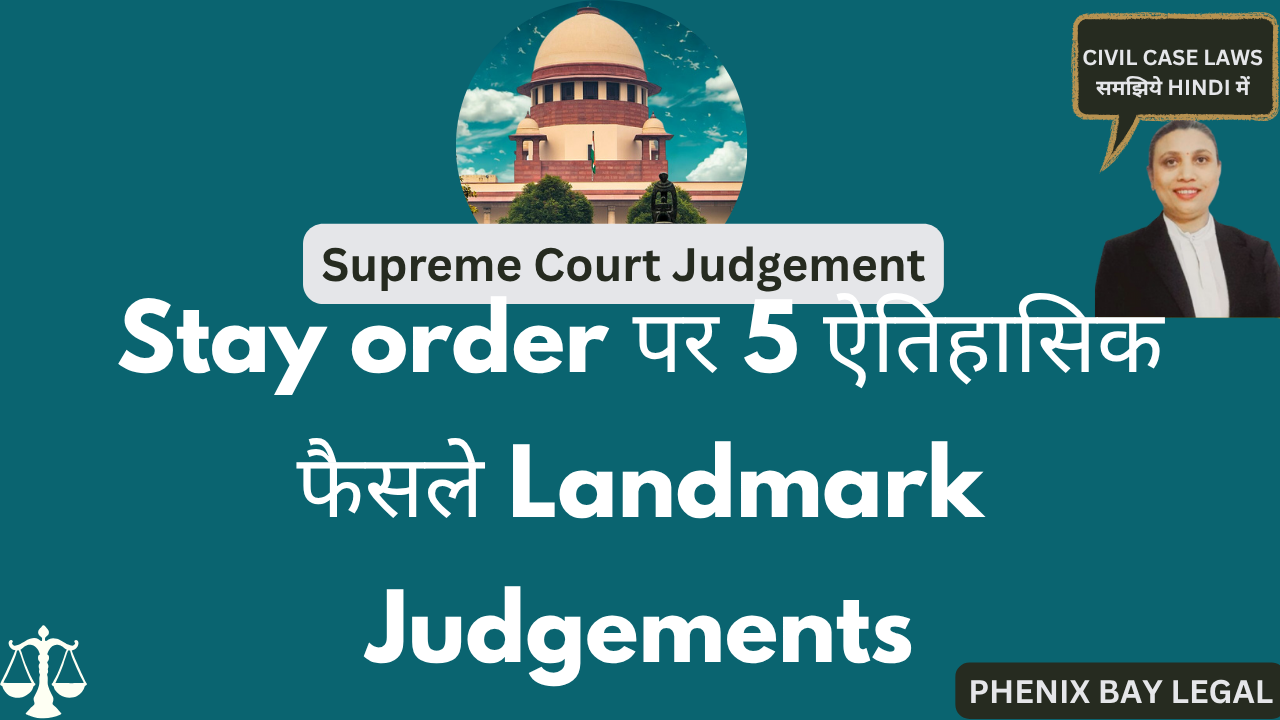
Landmark Judgement on Injunction
In civil, commercial, or even family disputes. But when is a simple injunction suit enough? When do you need to add a declaration of title? And how do courts balance urgency vs evidence in interim relief?
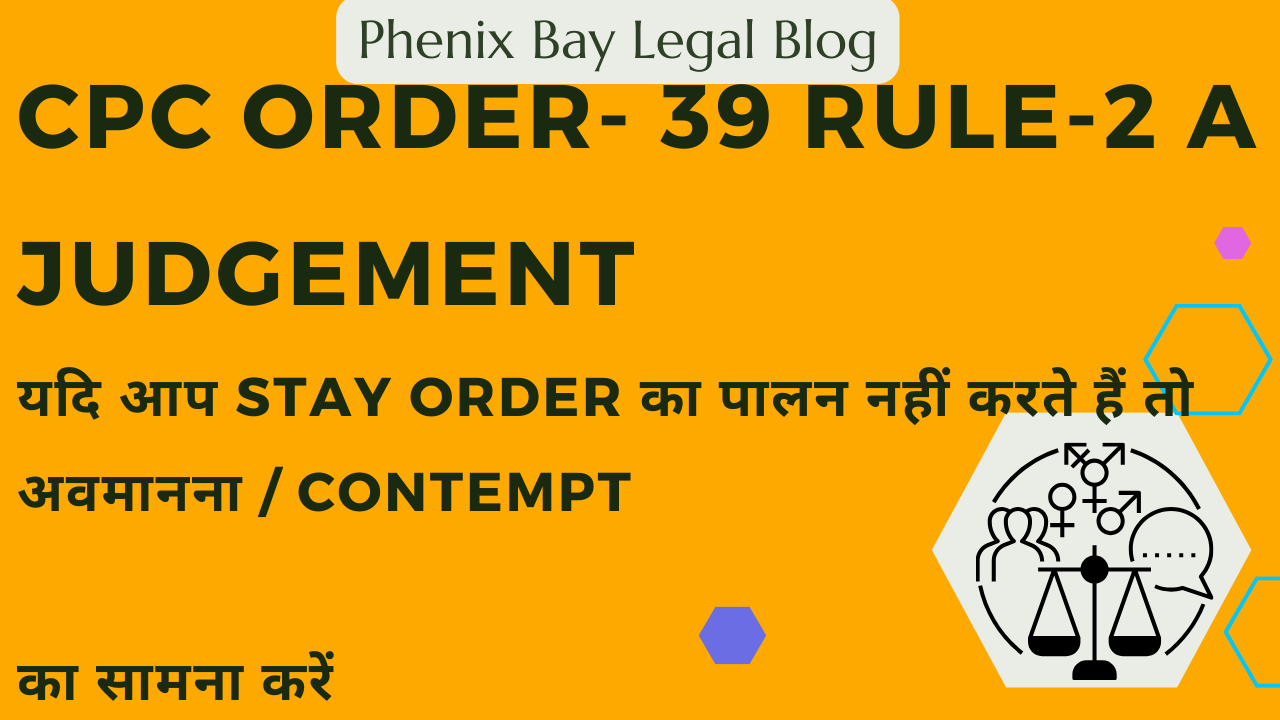
Case Analysis: Stay Order Violation and Contempt of Court by Supreme Court of India
Giving an undertaking to the court is equivalent to an order of injunction—any violation invites contempt proceedings.Injunction orders remain valid until formally vacated by a court—violation before vacation can lead to punishment.
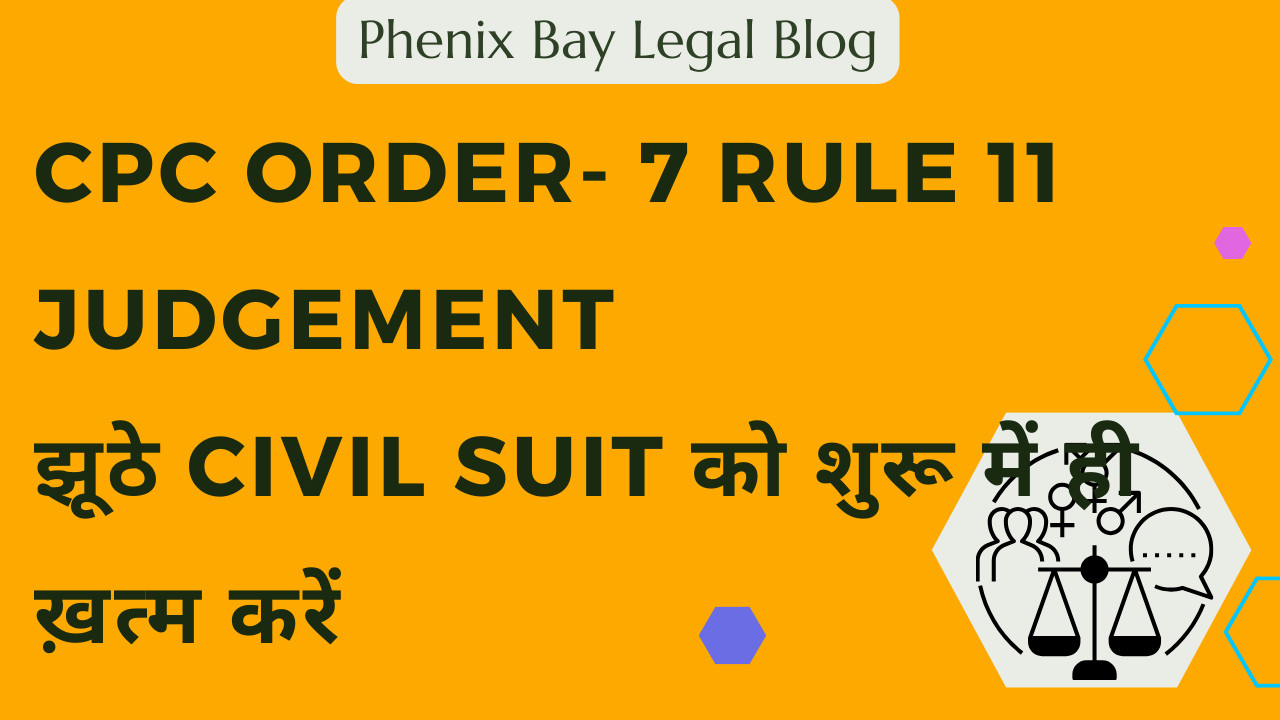
Order 7 Rule 11 of CPC Explanation in Land Mark Judgement
The Sopan Sukhdeo Sable judgment is a landmark ruling that reinforces Order 7 Rule 11 of CPC as a safeguard against frivolous and legally untenable claims. It highlights the importance of examining only the plaint’s contents to decide whether a suit should be dismissed at the threshold.
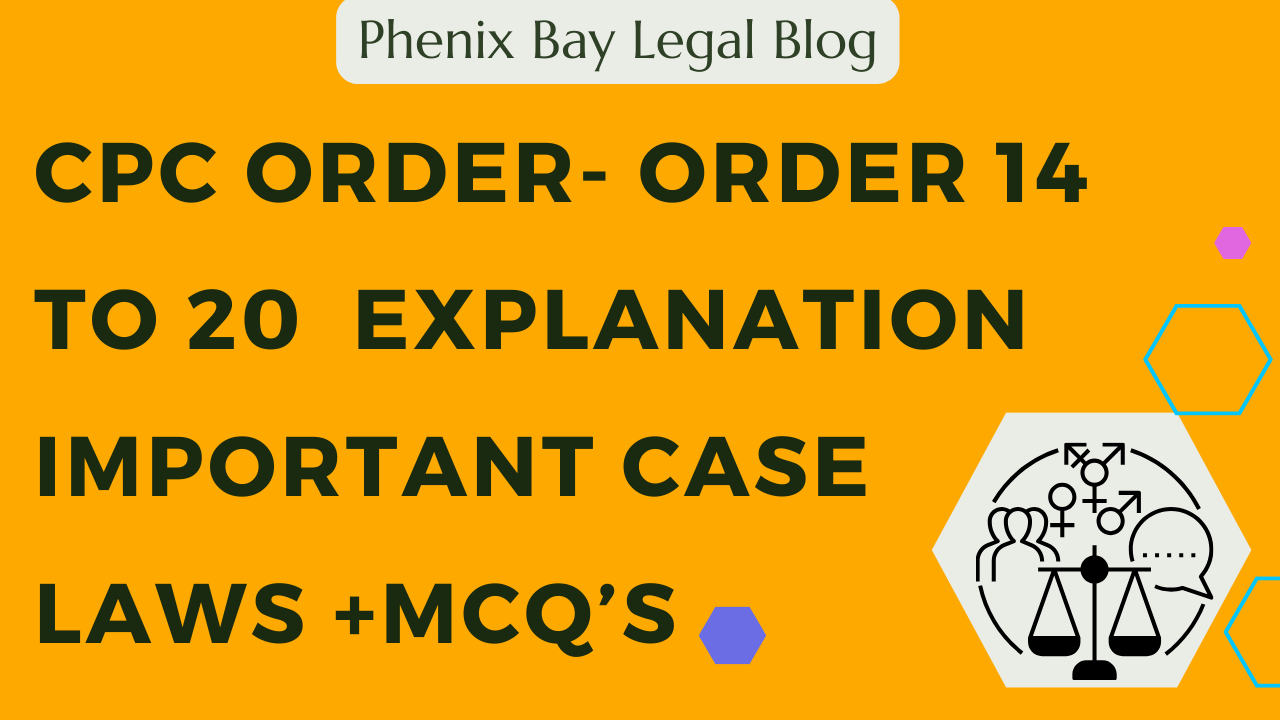
CPC Order- Order 14 to 20 Explanation IMPORTANT CASE LAWS +MCQ’S for Judiciary Exam Preparation
CPC Order- Order 14 to 20 Explanation IMPORTANT CASE LAWS +MCQ’S for Judiciary Exam Preparation
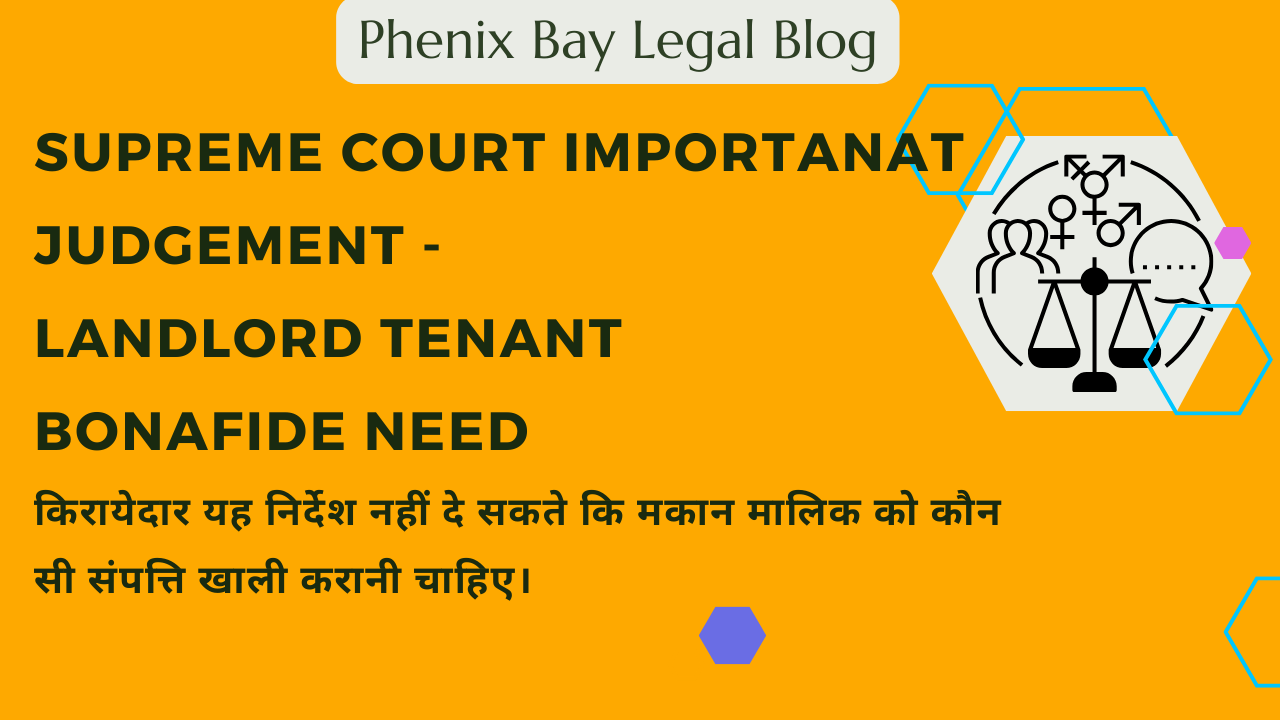
Supreme Court ImportanatJudgement - Landlord Tenant Bonafide need
This case involves a dispute over eviction of a tenant based on the bona fide need of the landlord. The Supreme Court ruled in favor of the landlord, reversing the High Court's decision. Below is a detailed breakdown of the judgment with relevant legal principles, precedents, and reasoning.